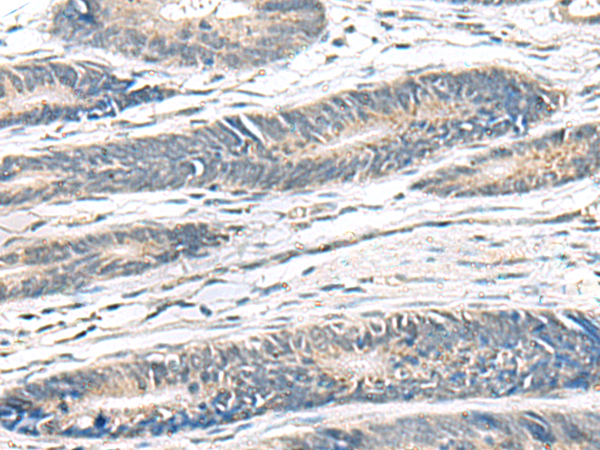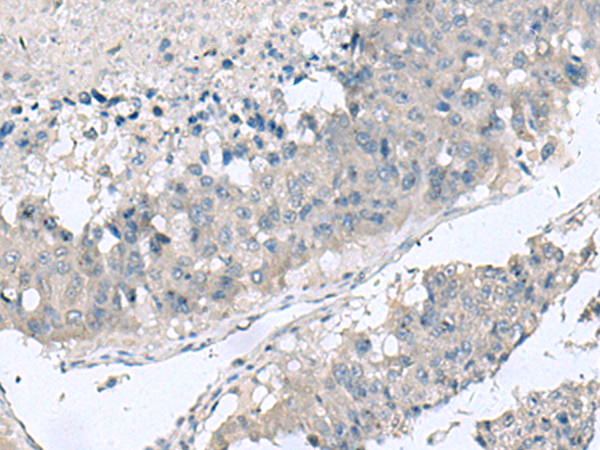

| WB | 咨询技术 | Human,Mouse,Rat |
| IF | 咨询技术 | Human,Mouse,Rat |
| IHC | 1/20-1/100 | Human,Mouse,Rat |
| ICC | 技术咨询 | Human,Mouse,Rat |
| FCM | 咨询技术 | Human,Mouse,Rat |
| Elisa | 1/5000-1/10000 | Human,Mouse,Rat |
| Aliases | DIF; TNFA; TNFSF2; TNLG1F; TNF-alpha |
| Host/Isotype | Rabbit IgG |
| Antibody Type | Primary antibody |
| Storage | Store at 4°C short term. Aliquot and store at -20°C long term. Avoid freeze/thaw cycles. |
| Species Reactivity | Human, Mouse, Rat |
| Immunogen | Synthetic peptide of human TNF |
| Formulation | Purified antibody in PBS with 0.05% sodium azide and 50% glycerol. |
+ +
以下是3篇关于TNF抗体的经典文献及其摘要概括:
---
1. **文献名称**:*A short-term study of chimeric monoclonal antibody cA2 to tumor necrosis factor α for Crohn's disease*
**作者**:Targan SR, et al. (1997)
**摘要**:该研究首次评估了嵌合型TNF-α单抗(英夫利昔单抗,Infliximab)在克罗恩病中的疗效。通过随机双盲试验发现,单次静脉注射可显著缓解中重度活动性克罗恩病患者的症状,验证了TNF-α作为治疗靶点的有效性。
---
2. **文献名称**:*Adalimumab, a fully human anti-tumor necrosis factor α monoclonal antibody, for the treatment of rheumatoid arthritis in patients taking concomitant methotrexate*
**作者**:Weinblatt ME, et al. (2003)
**摘要**:研究报道了全人源化TNF-α单抗(阿达木单抗)联合甲氨蝶呤治疗类风湿关节炎的Ⅲ期临床试验结果,证明其显著改善患者关节症状并延缓影像学进展,且耐受性良好。
---
3. **文献名称**:*Treatment of rheumatoid arthritis with a recombinant human tumor necrosis factor receptor (p75)-Fc fusion protein*
**作者**:Moreland LW, et al. (1997)
**摘要**:该试验评估了TNF受体-Fc融合蛋白(依那西普,Etanercept)治疗类风湿关节炎的效果,证实其通过中和TNF-α显著减轻炎症和疾病活动度,为生物制剂治疗自身免疫疾病奠定了基础。
---
4. **文献名称**:*Anti-TNF antibody therapy in rheumatoid arthritis and the risk of serious infections and malignancies*
**作者**:Bongartz T, et al. (2006)
**摘要**:Meta分析探讨了TNF抗体治疗类风湿关节炎时感染和恶性肿瘤风险,结果显示长期使用可能增加严重感染概率,但对恶性肿瘤风险无明确关联,强调了治疗中需权衡利弊。
---
以上文献均为TNF抗体领域的里程碑研究,涵盖疗效验证、机制探索及安全性分析。如需具体期刊或DOI信息可进一步补充。
Tumor Necrosis Factor (TNF) is a pro-inflammatory cytokine primarily produced by macrophages and lymphocytes, playing a central role in regulating immune responses, inflammation, and apoptosis. Discovered in the 1970s for its ability to induce tumor cell death, TNF is now recognized as a key mediator in autoimmune and chronic inflammatory diseases, such as rheumatoid arthritis, inflammatory bowel disease (IBD), and psoriasis. Dysregulated TNF signaling can lead to excessive inflammation, tissue damage, and disease progression.
TNF antibodies are biologic therapies designed to neutralize TNF activity. The first anti-TNF agents, developed in the 1990s, revolutionized treatment paradigms. These monoclonal antibodies (e.g., infliximab, adalimumab) or soluble TNF receptor fusion proteins (e.g., etanercept) bind TNF-α, preventing its interaction with cell surface receptors. This inhibition reduces inflammatory cascades, alleviates symptoms, and slows joint or tissue damage in autoimmune conditions.
Despite their efficacy, TNF blockers carry risks, including increased susceptibility to infections (e.g., tuberculosis reactivation) and potential drug-induced lupus. Ongoing research focuses on optimizing dosing, developing biosimilars, and exploring next-generation inhibitors with improved safety profiles. TNF antibodies remain a cornerstone in managing refractory autoimmune diseases, highlighting the importance of balancing therapeutic benefits with adverse effects.
×